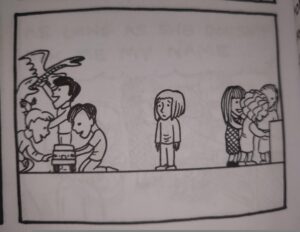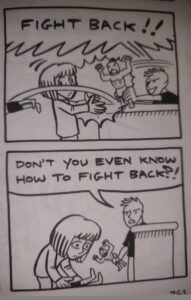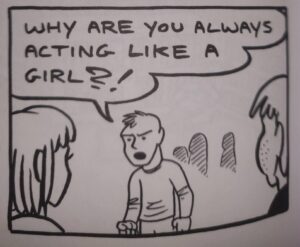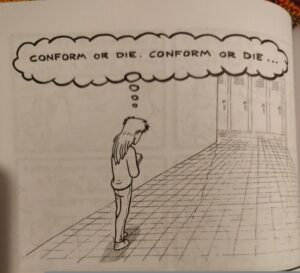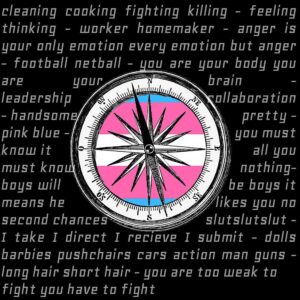 Trans women are women. But have we always been female? Or did we grow up as boys? For me, the answer is no. I was never a little boy who “became” a girl. This is what I have always been, no matter how long it took me to accept it. (I know not all trans women feel the same way, and that is ok too)
Trans women are women. But have we always been female? Or did we grow up as boys? For me, the answer is no. I was never a little boy who “became” a girl. This is what I have always been, no matter how long it took me to accept it. (I know not all trans women feel the same way, and that is ok too)
But hang on, isn’t that offensive to cis women, who were raised as girls and experienced horrific misogyny from a very young age? I do understand the sentiment. But at the same time, if you think that all of us were “socialised as male” and experienced the full benefits of that, I’m afraid you are mistaken. And I’d like to explain why. There’s three points – that girlhood is more than just trauma, that socialisation for trans girls is complicated, and that “male privilege” was more complex for us as well. I’ll begin each section with a quote or two, to showcase the kind of viewpoint to which it is responding.
Content Warning: discussion of CSA, transphobia, violence
Girlhood is more than just the trauma
“I will not call a male “she”; thirty-two years of suffering in this androcentric society, and of surviving, have earned me the title “woman”; one walk down the street by a male transvestite, five minutes of his being hassled (which he may enjoy), and then he dares, he dares to think he understands our pain? No, in our mothers’ names and in our own, we must not call him sister.” – Robin Morgan, 1973 speaking at the West Coast Lesbian Conference in Los Angeles (the group then split over this question)
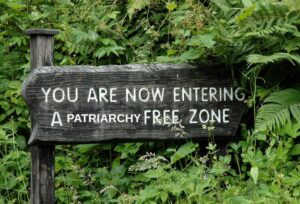 Imagine a cis woman who was lucky enough to grow up in some enclave of society where she experienced no misogyny whatsoever. (sadly this doesn’t exist – but just imagine it for a second!) Would you feel angry when she referred to her past as a girl, despite experiencing none of what you did? I don’t think you would. Even if trans women happened to have a wonderful childhood – can you see how retconning (*) our identity and seeing ourselves as always having been female, is the same kind of thing? It’s only trans women who are told we do not have enough trauma, in order for our gender to be valid.
Imagine a cis woman who was lucky enough to grow up in some enclave of society where she experienced no misogyny whatsoever. (sadly this doesn’t exist – but just imagine it for a second!) Would you feel angry when she referred to her past as a girl, despite experiencing none of what you did? I don’t think you would. Even if trans women happened to have a wonderful childhood – can you see how retconning (*) our identity and seeing ourselves as always having been female, is the same kind of thing? It’s only trans women who are told we do not have enough trauma, in order for our gender to be valid.
We all have differences and similarities, no two women are the same. Our traumas are not exactly the same, either. We don’t expect cis women to have experienced a quota of trauma in order to respect their past girlhood. So why is this standard applied to trans women? I think for some people it’s an excuse to treat us differently, but for many it’s a genuine lack of understanding. And when it comes to the darkest side of women’s experience under patriarchy – sexual harassment and sexual abuse – that misunderstanding is perhaps the gravest of all. Trans girls experience possibly the HIGHEST rates of CSA. More than cis girls and more than trans or cis boys. One study puts the prevalence as high as 58.2%. That’s horrific. It’s as though the perpetrators knew, like they knew on some level that we were not one of them. So this idea we are not traumatised enough to count as real women is not clear-cut at all. The statistics are summarized in this paper: https://www.ncbi.nlm.nih.gov/pmc/articles/PMC10311960
We weren’t “socialised male” either!
“Their truth is not my truth. Their female identities are not my female identity. They haven’t traveled through the world as women and been shaped by all that this entails.” – Julie Doucet https://archive.is/DtkGM
“Girls are socialized in ways that are harmful to their sense of self – to reduce themselves, to cater to the egos of men, to think of their bodies as repositories of shame. As adult women, many struggle to overcome, to unlearn, much of that social conditioning.
“A trans woman is a person born male and a person who, before transitioning, was treated as male by the world. Which means that they experienced the privileges that the world accords men. This does not dismiss the pain of gender confusion or the difficult complexities of how they felt living in bodies not their own.
“Because the truth about societal privilege is that it isn’t about how you feel. (Anti-racist white people still benefit from race privilege in the United States). It is about how the world treats you, about the subtle and not so subtle things that you internalize and absorb.” – Chimamanda Ngozi Adichie, in a statement posted to facebook https://facebook.com/photo.php?fbid=10154893542340944&set=a.469824145943
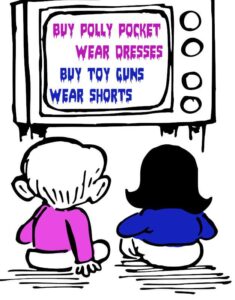 In my opinion trans people do NOT experience a typical childhood of either gender. Socialisation isn’t an individual but a collective process. It’s the messages you pick up from birth, based on the gender you associate with. Trans girls weren’t socialised male. We were socialised confused! On some level, we always saw ourselves as female. So every time we saw an advert or TV show with messaging for girls we felt, “yes, this message is for me. This is what I’m supposed to want. This is what I’m supposed to be like”. This happened from a very young age, long before we could talk or form memories. And so it reached into the core of what we are. When we saw women out and about in the world, we saw them as our blueprint, our example. We had that part of the collective experience of femininity.
In my opinion trans people do NOT experience a typical childhood of either gender. Socialisation isn’t an individual but a collective process. It’s the messages you pick up from birth, based on the gender you associate with. Trans girls weren’t socialised male. We were socialised confused! On some level, we always saw ourselves as female. So every time we saw an advert or TV show with messaging for girls we felt, “yes, this message is for me. This is what I’m supposed to want. This is what I’m supposed to be like”. This happened from a very young age, long before we could talk or form memories. And so it reached into the core of what we are. When we saw women out and about in the world, we saw them as our blueprint, our example. We had that part of the collective experience of femininity.
But on the other hand, our individual experience was very different. People saw us as boys, and tried to force us into that template against our wishes. To be a trans girl growing up is to be torn in two opposite directions. Observing one thing in the community, as part of the collective (eg “I’m a girl and everything in my culture is telling me to be gentle and not fight”), and then individuals telling you another (eg “you’re a boy so you like to fight. Defend yourself!”). And this is before we talk about sexuality, which adds a whole other layer of confusion on top of gendered expectations.
I recently saw one well-meaning cis person say online:
“The reason why, I think, this bothers me is because I recognized at a very young age that I (and other girls) were treated much different than boys while growing up. Our expectations were very different, physically, intellectually, and socially.. we were not allowed to rough-house and had to wear dresses, etc. My friend had a very different upbringing as a boy, despite being trans.”
And I’d like to say to her: don’t imagine your friend as a little boy “allowed to roughhouse”. Imagine her as a gentle little girl forced into the male section of society, FORCED to roughhouse when she didn’t want to, experiencing that as a confusing and constant threat of violence for reasons she could not understand. Never allowed her personal space and never having her bodily integrity respected. Stuck in the middle of all of the disgusting and/or violent rituals that groups of boys participate in. And she experienced this ALONE, as one little girl amidst a group of boys who would bully her mercilessly for showing any signs of discomfort. No camaraderie of friends who went through the same thing. No one to protect her or even share her experience. Is that something to be envious of? I’d be surprised if you think so.
Sure, we didn’t have the same upbringing as cis girls. But we didn’t have a cis boy’s upbringing either. A lot of our experiences are best described as: being a little girl forced into groups with boys and left to deal with that alone. That’s why some of us describe our past as such: it fits. It fits even if, except for those who transitioned very early, there was not the same kind of targeted sexual violence many cis women experience growing up (such as catcalling from early puberty perpetrated by adult men). We were still at more risk of sexual violence in childhood, just as we face sexual violence in adulthood as well. It was not the exact same – but nor is the experience of any woman, cis or trans. We all have differences and similarities. The experiences of a woman who grew up attending an all-girls private school in England are not the same as a woman who grew up in a favela in Brazil or in rural poverty in India. Nor does everyone assigned female at birth share the experience of periods, having children, and so on. The 0.1% of women who are trans are just one more thread in the vast tapestry of female experience.And let’s talk about the word “socialisation”. That word is deceptive. Socialisation, even for cishet boys, may not be a bed of roses. But for trans women it was a brutal and coercive process, designed to punish the smallest hint of femininity. Stamping out any trace of pride or self-esteem or self-expression. There was nothing “social” about it. Cis het boys may not all perfectly conform, but their experience is not like ours. For many of them it’s even a positive thing, leading to an over-inflated ego and sense of entitlement! Their heaven was my hell.
We have all been through hell. For many of us, growing up as trans girls in a boys’ world was like running the gauntlet. And we have the right to talk about that and to identify ourselves any way we damn well please!
Many of us trans girls could never fit into the male world. That’s not something we ever got to experience, because no matter how hard we tried we stuck out like a sore thumb. I remember the homophobic bullying I got as a teenager, because the other kids saw something queer in me but couldn’t understand what. I remember a teacher shouting in my face “YOU’RE LIKE A BLOODY WOMAN YOU ARE!”. I remember in groups of boys, trying to make myself as small and inconspicuous as possible. I remember having no idea how to join in, how to be “one of the lads”. Their attempts to socialise me into their gender failed. For me, transition was less a positive effort to become something new, more a finally letting go and returning to my natural state. Allowing myself to be what I always had been, all along.The irony of my life is prior to transition I was called a girl and after I am often called a man – Laverne Cox, writing on twitter
Some of us have ingrained habits and behaviours, taken on in order to survive, which we ought to unlearn. Sure. But that’s a far cry from saying every single one of us is unequivocally “socialised male”.
Privilege is… complicated
“It’s about the way the world treats us, and I think if you’ve lived in the world as a man with the privileges that the world accords to men and then sort of change gender, it’s difficult for me to accept that then we can equate your experience with the experience of a woman who has lived from the beginning as a woman and who has not been accorded those privileges that men are.” – Chimamanda Ngozi Adichie, in an interview broadcast on Channel 4. Quoted in https://www.washingtonpost.com/news/morning-mix/wp/2017/03/13/womens-issues-are-different-from-trans-womens-issues-feminist-author-says-sparking-criticism
“Use by [trans women] of feminine pronouns conceals the masculine privilege bestowed upon them by virtue of having been placed in and brought up in the male sex caste” – Sheila Jeffreys, Gender Hurts: A Feminist Analysis of the Politics of Transgenderism
Privilege theory has its limits, which I’m all too aware of. It brushes over the intersection that happens when privilege in one area coincides with oppression in another. For example, see this excellent thread by Laverne Cox on her experience as a black trans girl https://x.com/Lavernecox/status/840711779948740608. However, even within those limits, it’s very clear that trans women did not have all of the “male privileges” we were supposed to have had growing up. It was just not that simple. As I’ve already stated, socialisation is something that happens collectively. Something that depends on our own inner sense of gender to say, “this message is about me.” Bear that in mind when you look over this list: https://radicalprofeminist.blogspot.com/2009/12/100-male-privileges-checklist.html

a still from the TV show sense8, where a character relays her traumatic experience of bullying in a boys changing-room growing up
Some of these privileges depend not only on looking “like a boy”, but also on performing masculinity. Something few of us succeeded at even when we tried. What’s more – can you see how it’s hurtful to call something a privilege, when it came at the cost of complete self-suppression? A suppression we did not choose but rather felt was a matter of life and death? This isn’t the classic line of “boo hoo, patriarchy oppresses men too because they aren’t allowed to have emotions.” The experience is far deeper and more insidious than that. Just look at the average trans woman before her egg cracked, (**) compared to the average cis man, and you will see exactly what I mean. The fear, the pain, the stunted emotional expression.
And other privileges don’t apply, no matter how well you succeed at pretending to be a boy. For example, “I can turn on the television or glance at the front page of the newspaper and see people of my own [gender] widely represented, every day, without exception.” That one depends entirely on your own internal sense of gender! When you know you are not really a boy, seeing boys and men on screen does nothing to make you feel represented.
Now, it’s not clear cut. As I said before, I don’t think I had the default childhood of either gender. I experienced some things you might call “male privilege” at the exact same time as I was experiencing female oppression, and societal transphobia too. But equally, can you see how to say I was “socialized male” or had “male privilege” is both ridiculous and hurtful? I may not have had the same traumas as you did. I still went through hell. Alone. I was a little girl forced to pretend to be someone else, constantly surrounded by people who would destroy me if they found out. It was a case of hide to survive, conform or die. Accept every little assault and indignity as part of life. “Boys will be boys,” after all.It’s ok to say this. I have every damn right to say I was born a girl and will die a woman! That is who I am, who I was, and who I will always be.
* – “reconning” stands for retroactive continuity – where in fiction, a new storyline explains or changes a previous event or attaches new significance to it
** – “cracking your egg” is a phrase used in the trans community to describe realising/accepting that you are trans, finally emerging from your shell
